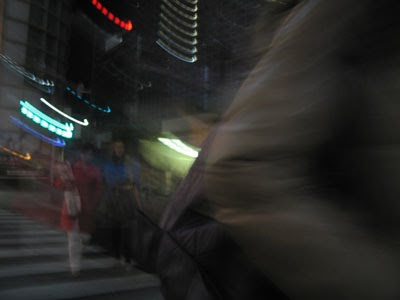Tokyo, not quite so cool when you are unemployed
That most of the men sleeping rough in Tokyo's streets and parks were born in beautiful country areas of Japan, like Aizu, somehow makes it more painful. They had to leave home because there were too many children to feed in the post-war years of struggle, there was no prospect of work locally, and farming was in any case in decline. Now after years of hard work in the construction industry and other areas of temporary and insecure employment, they are too old or ill to compete in the recession-shrunk labour market. With a dire lack of social housing and a draconian rented sector it is not hard to fall off the housing ladder here - and the bottom rungs are broken. Large deposits are required, and a guarantor, both a tough ask for people with no savings or family support. The vulnerably housed are also preyed on by various scamming businesses which turn a profit and increase insecurity and poverty.
Everyone is busy or on a night out - but you will be out all night
Younger people are appearing in the parks at feeding stations in greater numbers too, their 'bed' of choice often being a chair in an all night internet cafe. Young people in the countryside still suffer from 'The Tokyo illusion,' according to Tsuyoshi Inaba. He is a founder member of Shinjuku Renrakukai, Japan's first homeless support group, and chairs Moyai, an NPO that tries to provide and campaign for routes back into accommodation and a semblance of ordinary life. He explained their unrealistic expectations. 'We get lots of calls from young people in the countryside. They are not getting on with their family, so they say they are thinking of coming to Tokyo to work. We tell them not to come, as there is very little work here, and they might have to sleep rough.'
How about here? There is enough space, but no cover and it might rain
I joined the homeless patrol on a cold night in Shinjuku last week, and the changes over the ten years since I first did so were obvious, with a wider age range, fewer shelters allowed in the parks, and more people bedding down wherever they could on the pavement and under bridges with nothing more than cardboard boxes, if that. Although campaigners have succeeded in persuading the Tokyo Metropolitan Government to provide more temporary apartments in return for negotiating a reduction in people living in the parks, it isn't enough. The recession has made it worse, and NGO's like Moyai are under severe pressure from the numbers asking form help.
Maybe here? Too near the station, the police won' t like it
After 400 people had been fed, three teams assembled to check the whole Shinjuku area. They consisted of homeless and ex homeless people, volunteers and group members. They count the numbers sleeping rough, and speak to everyone to make sure they know how to ask for further assistance, to identify people who might need medical treatment, and to make the social connections that make life on the street more bearable.
Ok, this is under a bridge - not too many people
I was angry all over again at the gulf between the often negative perception of homeless people in Japan and the reality. This was ironically underlined by one of the men sleeping rough with a mate in a quiet side street. "When I was working building the subways I used to look down on the homeless and fight them."
I was particularly impressed with a man standing in a compound just big enough to lie down in, a futon walled with cardboard against the wind . Next to him was a man lying on the bare pavement, tightly swaddled like an Egyptian mummy from head to foot, even his face eerily covered. "I am OK," said the first man, "I have a shelter, but I am really worried about this man next to me - he doesn't have anything."
This is it for the night. Move on in the morning if you are left alone that long
This need to care for others is apparently a deeply ingrained part of our self-hood. It is abundant in country areas like Aizu and it is surprisingly intact on the streets here. Some men were simply sitting down on benches. You can't lie on them as the authorities have kindly bolted dividers on any horizontal surface. One man on his own on a park bench was grinning broadly in the dark. A thin mewling cry went up, and between his big hands was cradled a new-born kitten. He was feeding it with milk from a straw. Others were in a blanket-covered box, and he reached deep into his coat and brought another out from his armpit, then more from pockets. They had been abandoned in the park, and their new parent, abandoned himself, was going to see to it that they lived. He didn't need anything from us just then, and we left him, still smiling.
Another dash of incongruous white moved in the darkened park: a white rabbit. Abandoned three years ago, it has survived against the odds surrounded by hungry people. Inaba-san said "They often say that they want to eat it, but no-one ever does." Well, perhaps there is nothing so strange about that - it certainly isn't as strange as one of the richest countries in the world letting its young and old people down so badly.
************************
Have a look at my portraits of Japanese homeless people:














